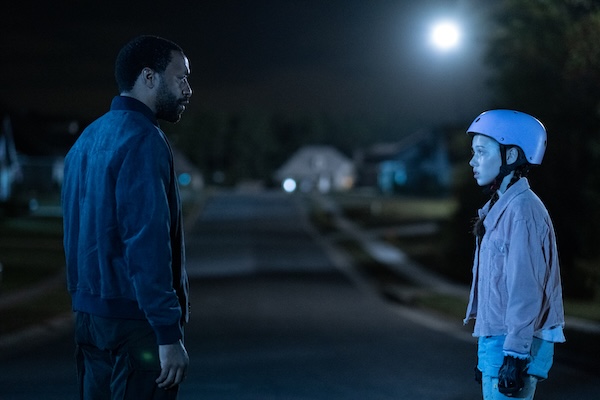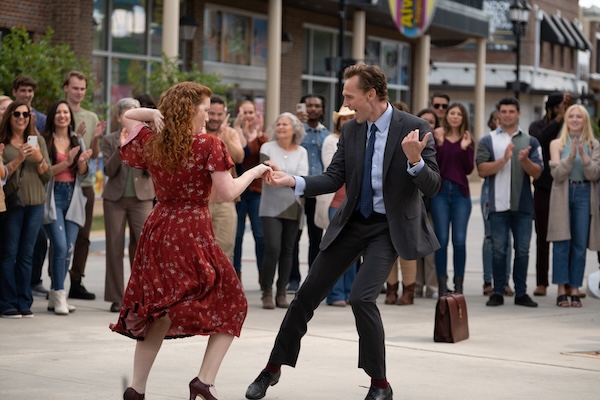Film Review: “The Life of Chuck” — More Schmaltz Than Substance
By Ezra Haber Glenn
The problem with The Life of Chuck isn’t that it’s bad, per se, but it’s nowhere near great, and that’s a waste of a lot of talent and potential. Imagine Terrence Malick’s Tree of Life turned into a made-for-TV after-school special.
The Life of Chuck, directed by Mike Flanagan. Screening at movie houses throughout New England

Tom Hiddleston in The Life of Chuck. Photo: courtesy of Neon
Stephen King is amazing. Over the past 50 years he’s written 65 novels and hundreds of short stories — more than four times the lifetime output of Dickens, over 30,000 pages in total, according to one calculation. Throughout this steady production, he consistently delivers compelling and innovative premises, relatable characters, and solid — sometimes beautiful — writing, time after time.
Given this, it’s no wonder that so many of his stories have been turned into movies: ScreenRant lists 55 films so far, more than any living writer (although he still has a ways to go to match Shakespeare’s 410 adaptations…). Of course, some of these films have very little to do with the works that inspired them (I’m looking at you, Lawnmower Man), while others hew much closer to the source, which can be tricky, given how looooong some of these books are. (King’s bestselling killer-clown horror novel It clocks in at 1,138 pages, requiring two full movies — which still left out a lot.)
Some of the best King adaptations, such as Stand By Me or Shawshank Redemption, spring from shorter material — stories or novellas — which provide more breathing room for cinema to do what it does best, visually — at times moving slowly, not dedicated to racing through and checking off every plot point. Too much fidelity to a mega-tome can easily become exhausting, though too little renders the story thin or incomprehensible (and pisses off the die-hard fans). In contrast, a short story gives just enough of the bare basics — a character or two, a simple arc to contemplate, a mood to serve as a touchstone, a few key scenes — and a thoughtful director and some solid actors can do the rest.
From this perspective, Hollywood’s latest adaptation of King’s work, The Life of Chuck, promised to be just the right package. Originally published in 2020 as three interconnected chapters in the collection If It Bleeds, the story follows the titular Chuck through three phases of life and death — or technically, death and life. The stories are presented in an “inverted timeline,” starting at the end and working backwards. Mirroring this format, writer/director Mike Flanagan structures a reflective, nonlinear narrative that traces time upstream, seeking Chuck’s formative experiences.
Like Boyhood or Tree of Life, the film sets out to be an ambitious yet intimate epic, unpacking the fleeting moments that make a single life meaningful against the finality of death and the vastness of the cosmos. (The tagline is, “the extraordinary story of an ordinary man.”) The pieces are all there: a talented cast, a few key moments, a sweet, life-affirming message. But, unfortunately, the project falls flat.
Flanagan is a competent director who has adapted two of King’s books already (Gerald’s Game and the “many years later” sequel to The Shining, Doctor Sleep), both of which were well-received. His earlier work sits in the solidly “creepy or slasher” horror genre, which is much less “life-affirming” than the present project. Unsurprisingly, the strongest parts of The Life of Chuck occur in the first segment, when Chuck begins to shuffle off his mortal coil, highlighting the eerie and supernatural aspects of his story. The mystery builds as we try to make sense of the plot in media res (or perhaps in finales res, given Chuck’s condition), and that gives Chiwetel Ejiofor the opportunity to deliver an excellent performance as an everyman caught in a world collapsing around him. (He’s not Chuck exactly, but he’s connected — it sounds complicated, but it all becomes clear when you see the movie.) He maintains a nice emotional balance — a slight mix of confusion, hope, fear, and the welling of a tear in the corner of his eye — as he tries, over a calm 20 minutes, to wrap his head around some BIG EXISTENTIAL QUESTIONS as life leaks out of his universe.

A scene from The Life of Chuck. Photo: courtesy of Neon
Without giving away too much, The Life of Chuck starts off as an intriguingly twisted version of The Truman Show meets Inception but ends, disappointingly, in a pat resolution stuck somewhere in the sappy nostalgia of The Wonder Years and Peggy Sue Got Married. The film was recognized with the People’s Choice Award at the Toronto Film Festival, and you can see why: it’s sweet and quirky and inoffensive, and doesn’t really say much or dig deeply. Remember: “crowd-pleaser” doesn’t necessarily mean “thought-provoker.” The whole thing could be summed up by a cheesy embroidered sampler hanging in the kitchen: “The Real Treasure Was the Friends You Met Along the Way…”
These days we certainly need more art that is life-affirming. There is nothing wrong with being earnest or celebrating the exciting “multitudes” contained in every “ordinary” human life. (The film draws heavily on Walt Whitman’s “Song of Myself,” including a few scenes that could easily be outtakes from Dead Poets Society.) But after the first act, Flanagan loses his edge and “sweet” becomes sentimental, treacly, even schmaltzy. The centerpiece is a spontaneous outdoor dance number that resembles nothing so much as a heartwarming flash mob performance you might stumble upon while scrolling Facebook. The third “childhood” sequence gives us Chuck’s early years, with a Bubbe and Zayde straight from central casting, including Mark Hamill trying his best to be Wilford Brimley from the 1980s Quaker Oats commercials and a trite “will he/won’t he?” drama centered on young Chuck (Benjamin Pajak) at the junior high dance. Throughout this tired fare, the mellow tones of Nick Offerman’s voiceover chunkily insist that we understand exactly what we are supposed to understand from these episodes. The fear is that we might decide to think for ourselves.

A scene from The Life of Chuck. Photo: courtesy of Neon
Given the budget, the source material, the generally strong cast (including both seasoned performers and emerging young talent), some beautiful cinematography, and Flanagan’s directorial chops, the overall result is a frustratingly missed opportunity. Not a flop, not even bad — just not good. Importantly, the overall objective — make an epic film about an everyman — is not the problem, and it’s not that the script needs more drama. In fact, one of the “plottiest” aspects here — the secret off-limits attic room in Chuck’s grandparents’ haunted Victorian house — is actually one of the worst parts of the story. It’s spooky and supernatural, but the horror trope is clichéd to the point of boring. Even worse, this scary element is tonally inconsistent with the rest of the story, contrived and tacked on, not woven in: having Chuck grow up in a haunted mansion seems a far cry from the “ordinary” life we are supposed to be experiencing.
One might also question why, once again, the ordinary life we are celebrating needs to be a white accountant who looks like Tom Hiddleston auditioning for Mad Men: a more courageous script and casting might have pushed mainstream audiences to identify with the “ordinary” in a less typical character. What’s missing isn’t plot, or clarity, but artistic subtlety. A braver approach would believe its own egalitarian premise and ease up on the narrative reins (and get that damn voiceover out of our heads), trusting even ordinary untrained “everyman” viewers to see and appreciate the meaning of Chuck’s life without all of the “helpful” signposts and spotlights.
The Life of Chuck has its heart in the right place, but it fails to deliver. If you’re looking for a sci-fi crossover feel-good movie based on a thoughtful short story about the arc of a life and the moments that truly matter — not a bad way to spend an afternoon — stay home and stream Arrival (2016, Denis Villeneuve) instead.
Ezra Haber Glenn is a Lecturer in MIT’s Department of Urban Studies & Planning, where he teaches a special subject on “The City in Film.” His essays, criticism, and reviews have been published in The Arts Fuse, CityLab, the Journal of the American Planning Association, Bright Lights Film Journal, WBUR’s ARTery, Experience Magazine, the New York Observer, and Next City. He is the regular film reviewer for Planning magazine, and a member of the Boston Society of Film Critics. Follow him here.
Tagged: "The Life of Chuck", Chiwetel Ejiofor, Jacob Tremblay, Karen Gillan, Mark Hamill, Mike Flanagan, Stephen King

WORST MOVIE EVER MADE!!!!!!!!!!!!!!!!!!!!!!!!!!!!!!
I think the review is spot on…… this film has the right ingredients, but somehow just misses. It’s a shame not to care about the end of the universe (or at least one of them), but in the end you just don’t. Bit boring at times, too.
Lost me when Mars and other “heavenly bodies” exploded with immediate loud bangs. And the boring notation.